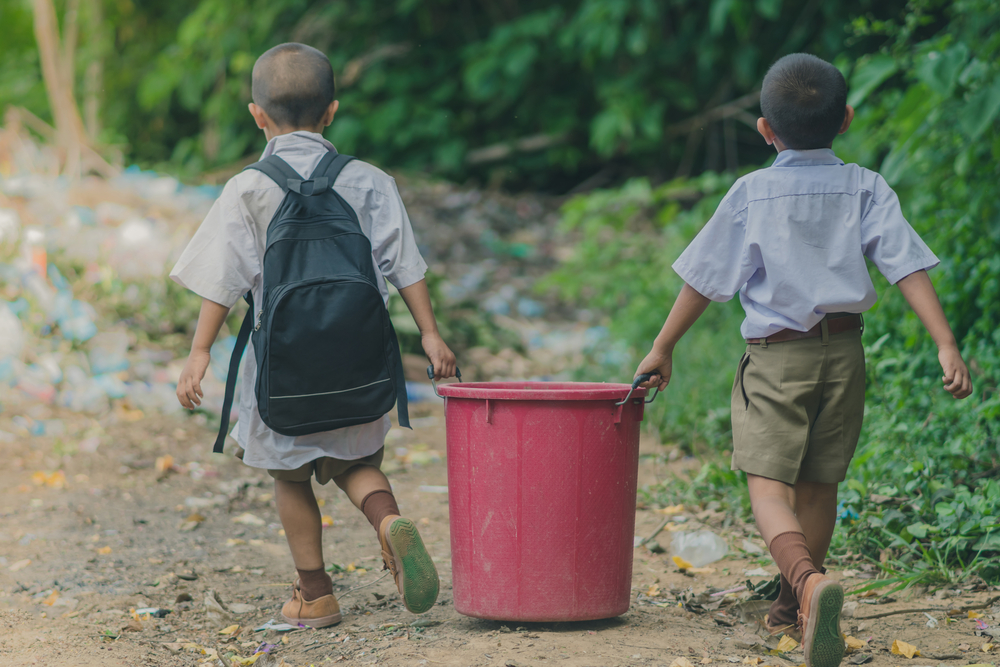A study published in Environmental Health Perspectives, led by Devon C. Payne-Sturges from the University of Maryland School of Public Health, revealed that children of color, particularly Black, Hispanic, and low-income children, experience higher levels of mental health issues. Discriminatory government policies were identified as the root cause.
The study focused on air pollution and lead as the most common exposure for children, resulting in neurodevelopmental concerns that affect cognitive, behavioral, and psychological aspects. Children exposed to higher levels of these harmful substances have more difficulties with attention, focus, and behavior. The study, which reviewed over 200 articles, also sheds light on the systemic and historical injustices that contribute to mental health inequalities.
“Scholars on race, racism, and environmental justice have linked disproportionate exposures to racist and discriminatory policies and processes such as racial residential segregation, disproportionate citing of polluting sources in communities of color, and government-backed policies to dispossess Native Americans of their lands and cultures,” the authors write.
The research, conducted by a team including Taiwo K. Taiwo, Kristin Ellickson, Hannah Mullen, Nedelina Tchangalova, Laura Anderko, Ami Zota, and Megan Swanson, explores the stark disparities in toxic chemical exposures and the resulting neurodevelopmental outcomes. It reveals that children of color and those from low-income backgrounds are more vulnerable to the harmful effects of environmental pollutants due to discriminatory government policies and ecological injustice.
 Children are exposed to toxic chemical pollutants, and an alliance of scientists and health professionals (Project TENDR) aims to protect children from harmful long-term brain development harm in children. Payne-Sturges and colleagues conducted a scoping review of 218 studies or investigations on seven environmental pollutants to map the literature on disparities in outcomes for children in the United States who are historically considered marginalized. Systematically, the research team scanned studies from 1974-2022, and selection criteria were used to select studies that included social inequality consideration and the effects of toxic environmental exposures.
Children are exposed to toxic chemical pollutants, and an alliance of scientists and health professionals (Project TENDR) aims to protect children from harmful long-term brain development harm in children. Payne-Sturges and colleagues conducted a scoping review of 218 studies or investigations on seven environmental pollutants to map the literature on disparities in outcomes for children in the United States who are historically considered marginalized. Systematically, the research team scanned studies from 1974-2022, and selection criteria were used to select studies that included social inequality consideration and the effects of toxic environmental exposures.
Seven neurotoxicants were targeted in the study, and the research team determined in the review that most studies (92%) did not provide adequate explanation or conformity on how race and ethnicity were defined. Payne-Sturges and her colleagues have concluded that race, ethnicity, and socioeconomic status could be factors that lead to disproportionate exposure and harmful outcomes related to exposure to chemical substances. However, the research team notes that it is unclear how social constructs of race and poverty interact with these chemical exposures. Nevertheless, this should not prevent immediate action to address the harm experienced by the children of these communities.
It has been found that one out of every six children in the United States suffers from a neurodevelopmental disorder. This number has significantly increased for all children, particularly for Black, low-income, and rural children. Studies have shown that sociodemographic and socioeconomic factors are responsible for higher exposure to lead, pesticides, air pollution, and neurotoxic chemicals in plastics. The impact of these exposures on brain development is most severe in disinvested neighborhoods and can affect everything from behavior and memory function to rates of autism.
“As a result of discriminatory practices and policies, families with low incomes and families of color are currently and historically disproportionately exposed to chemicals without their knowledge or consent where they live, work, play, pray and learn,” co-lead author Devon C. Payne-Sturges, Project TENDR member and associate professor at the University of Maryland School of Public Health, said in a statement.
“Their neighborhoods are more likely to be located near factories, chemical plants, superfund sites, highways, and more vehicle traffic, or by agricultural fields where pesticides are applied.”
Because of policy gaps related to environmental protections, the authors and Project TENDR members have issued statements and an immediate call for action to the FDA and EPA to rectify the disproportionate harm to children born into environments that impact their trajectories for long-term success even before birth. Lower IQ scores, attention and focus, autism, and memory impairment are unjust outcomes that affect individuals across their lifespan.
The result of the scoping literature review creates a complex story about disproportionate harm. The research team notes that the variance across the body of literature in defining race and ethnicity could be considered a limitation but argues that policymakers’ failure to act will continue to perpetuate harm to vulnerable communities.
Inconsistencies in defining race and sometimes combining race and ethnicity is a known challenge in more than one research field and can be overcome by understanding the larger scope of implications of government policy that is harmful to collectively oppressed groups, regardless of precise racial categorization.
There have been persistent efforts to represent the diversity of racial demographics in the United States precisely. Multicultural and multi-racial differences are an ongoing topic of discussion, and both Project TENDR and the government agree that these differences should not hinder sensitive policymaking progress.
Payne-Sturgis and their colleagues are urging policymakers to take immediate action to address the findings of a comprehensive literature review. Delaying action could potentially cause further harm, especially to children of color and those living in poverty. Previous research has shown that environmental factors can have a significant impact on mental health, and some studies have even linked them to severe conditions like psychosis. Therefore, it is crucial to address these issues promptly to prevent long-term consequences.
The urgency to tackle long-standing systemic racism through government policy is a pressing responsibility. Payne-Sturges explains:
“FDA and EPA can act now — not later — to protect families from neurotoxic chemicals by banning phthalates from food contact materials; eliminating lead from residential environments, aviation gas, and children’s foods; ending the use of organophosphate pesticides and setting air pollution standards to protect child brain development.”
****
Payne-Sturges, D. C., Taiwo, T. K., Ellickson, K., Mullen, H., Tchangalova, N., Anderko, L., Chen, A., & Swanson, M. (2023). Disparities in toxic chemical exposures and associated neurodevelopmental outcomes: A scoping review and systematic evidence map of the epidemiological literature. Environmental Health Perspectives, 131(9). https://doi.org/10.1289/ehp11750















Corporate interests tend to drive big money. Big money tends to drive government policy. Politicians might listen to the voters if they get flooded with emails and phone calls pretty much saying the same thing. Even then they will try to work out an arrangement with the people who have the real power in government, the lobbyists and the big donors. Unless massive amounts of voters stay completely on top of the language and implications of the legislation as it progresses and stay vigilant, steadfast and active in a unified voice even if they have to pay close attention at crazy hours of the night when last minute things can be quietly slipped into the bill, then maybe just maybe they might get a fairly good deal. Realistically though, if you really want to influence government policy, you need to influence the influencer’s of government policy. You have to convince the large businesses and corporations that egalitarian humanitarianism is more profitable than what they are doing. If they are not convinced through economic persuasion then it looks like we have some pretty sick and twisted people pulling the strings of power. To fight that looks pretty futile. There doesn’t seem to be any other option in that case than to wait for Faust to get taken down by the devil. Basically, when a group of powerful men think they have all the power, they keep wanting more and more power until they start turning their guns on each other. A way to keep from being part of such a bloody mess like that is to care about other people. Often trying to save the poor is not so much about saving the poor as it is giving you the opportunity to save yourself.
Report comment